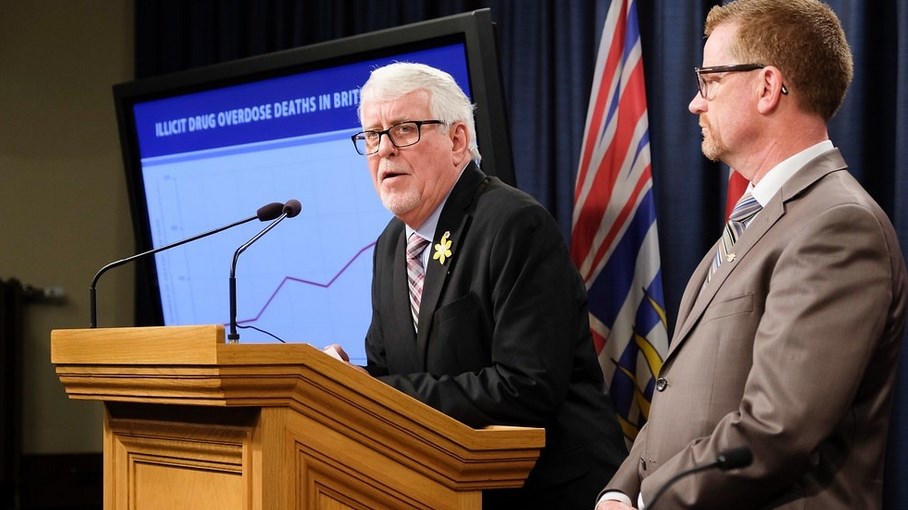April 14 marks a sobering anniversary in B.C. – five years since the overdose health emergency was proclaimed in the province.
In the past 25 years, more than 12,632 British Columbians have died of illicit drug overdoses. That’s equal to the population of the city of Terrace.
Since the 2016 emergency declaration, some 7,000 have died.
By January, an average of 5.3 people were dying daily.
"Today, we remember and grieve the thousands of people who have lost their lives in B.C. due to a toxic illicit drug supply," B.C.'s chief coroner Lisa Lapointe said.
She said overdose is the fourth highest cause of death in B.C. with the average age of death being 43.
“Behind each overdose statistic is a person,” provincial health officer Dr. Bonnie Henry said.
“Before the COVID-19 pandemic began, overdose deaths had declined for the first time since 2012,” Premier John Horgan, Minister of Mental Health and Addictions Sheila Malcolmson and Henry said in a joint statement.
“The pandemic set us back with a disruption in the supply chain for illicit drugs, making them highly toxic and unpredictable, in addition to increased isolation,” the statement said. “Tragically, more people died by overdose in 2020 than ever before in our province's history.”
It was then-provincial health officer Dr. Perry Kendall who issued the 2016 declaration.
And, said Lapointe and Kendall, the COVID-19 pandemic has shown B.C. can mobilize to fight a health problem.
"There is a stark and dreadful contrast in how we as a society have responded to the two public health emergencies,” Kendall said. “2021 is the year to stop temporizing and take the necessary steps to put an end to this tragedy."
Malcolmson said border closures disrupted drug trafficking, leading to drugs being mixed with domestic ingredients such as fentanyl. That, she said, led to increased deaths.
The minister said work to combat the tragedy includes supervised consumption sites, wide availability of opioid-overdose-reversing naloxone, building up treatment and recovery services, adding new treatment beds province-wide and trailblazing first-in-Canada solutions like prescribed safe supply, nurse prescribing and taking action on decriminalization.
Today, Malcolmson announced $45 million for more supervised consumption sites and overdose prevention services over the next three years. That will include expanded naloxone availability and increased outreach services.
“We will not stop working until one day the overdose crisis is something in our province’s past,” Malcolmson said. “Each life lost to overdose is a tragedy.”
She said further announcements would come with next week’s provincial budget.
Further, she said, B.C. will formally request from Ottawa a provincial exemption from the Controlled Drugs and Substances Act to allow personal possession of drugs.
“People who use drugs are in a health crisis and should not face criminal charges,” she said. "Through province-wide decriminalization, we can reduce the fear and shame that keep people silent about their drug use, and support people to reach out for help, life-saving supports and treatment."
She said drug testing for users has gone hand in hand with increased safe consumption areas and increased outreach.
“The expansion of safe consumption sites will continue,” Malcolmson said. “The work to expand safe supply is ongoing.”
But, she said, with so many different drugs being used, providing safe supply is a complex issue and work to provide other drugs in that system is ongoing.
First Nations Health Authority acting chief medical health officer Dr. Shannon McDonald said Indigenous people account for a disproportionate number of those dying.
She said efforts to stem the deaths have failed and new efforts are needed.
“We want to ensure that people who need help can get it,” she said.
The death rate began to climb in 2011 but skyrocketed to 991 in 2016, the year then-provincial health officer Dr. Perry Kendall declared the health crisis. Nearly 7,000 have perished since that declaration, more than 330 since the end of February. Last year was the worst to date. Deaths hit a high in 2020, with 1,724 people succumbing to highly potent illicit drugs.
In comparison, 1,515 British Columbians have died of COVID-19.
Long before the COVID-19 pandemic, Kendall’s emergency powers notice was the first under B.C.’s Public Health Act.
Despite the declaration, fatalities continued to surge: 1,493 in 2017 and 1,550 in 2018.
Kendall said the declaration was step one in ensuring health authorities had data to inform responses and prevent future overdoses.
At the time of the declaration, there was no ministry dedicated to the situation, a case that changed with the creation of the Ministry of Mental Health and Addictions when the NDP took power in 2017 with now-retired New Westminster MLA Judy Darcy as the first minister.
The ever-increasing death count has led to an increase of calls for a safe supply of drugs for addicts, for calls to change drug possession laws.
However, even as the funerals continued, the provincial government had one eye on public opinion, Glacier Media has reported. Negative public reaction to giving addicts a free safe drug supply was a key consideration for NDP government decision makers as they came to grips with the crisis, documents obtained under access to information laws revealed.
B.C. Green Party Leader Sonia Furstenau said those who have lost their lives have done so as a result of not only bad drugs but also bad drug policy.
“The best way we can acknowledge the pain, suffering and the people left behind is to do a better job at preventing future deaths,” Furstenau said.
She said there are systemic issues around stigmatization, insufficient mental health supports, inequality, lack of housing and insufficient wraparound services.
“We will continue to hold government to their promise to decriminalize simple possession and to expand safe, regulated supply,” Furstenau said. “Government needs to urgently invest in treatment and non-stigmatized support for people who use drugs.”
@jhainswo



